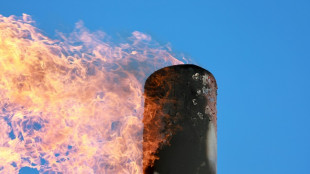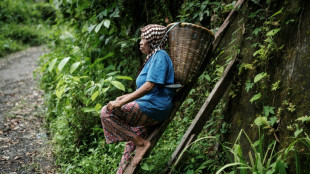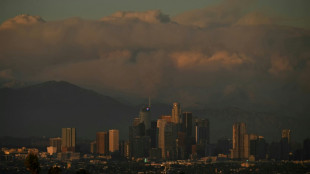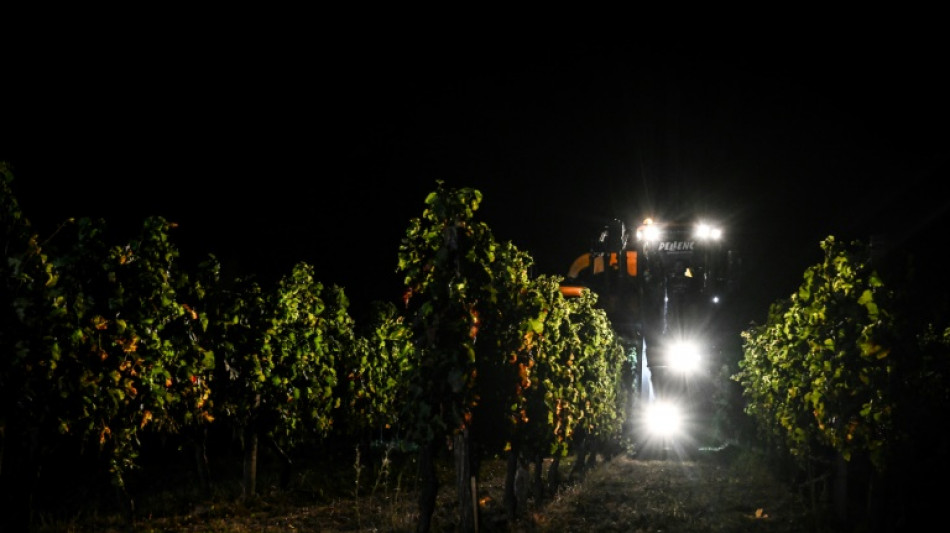
-
 Slot says all at Liverpool sad to see Alexander-Arnold go
Slot says all at Liverpool sad to see Alexander-Arnold go
-
Leo XIV celebrates first mass as pope in Sistine Chapel

-
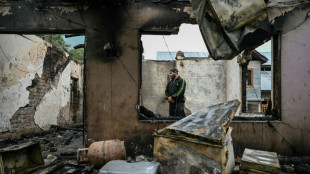 India says repulsed fresh Pakistan attacks as death toll climbs
India says repulsed fresh Pakistan attacks as death toll climbs
-
Japan's Panasonic targets 10,000 job cuts worldwide
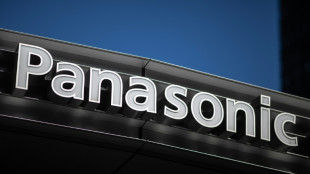
-
 Putin evokes WWII victory to rally Russia behind Ukraine offensive
Putin evokes WWII victory to rally Russia behind Ukraine offensive
-
China exports beat forecasts ahead of US tariff talks

-
 Leo XIV, the 'Latin Yankee', to celebrate first mass as pope
Leo XIV, the 'Latin Yankee', to celebrate first mass as pope
-
Most stocks lifted by hopes for US-China talks after UK deal

-
 IPL suspended indefinitely over India-Pakistan conflict: reports
IPL suspended indefinitely over India-Pakistan conflict: reports
-
German lender Commerzbank's profits jump as it fends off UniCredit

-
 Rare bone-eroding disease ruining lives in Kenya's poorest county
Rare bone-eroding disease ruining lives in Kenya's poorest county
-
India says repulsed fresh Pakistan attacks as de-escalation efforts grow

-
 Zhao's historic snooker title sparks talk of China world domination
Zhao's historic snooker title sparks talk of China world domination
-
'High expectations': EU looks to Merz for boost in tough times

-
 Poisoned guests rarely invited before deadly mushroom lunch, Australia trial hears
Poisoned guests rarely invited before deadly mushroom lunch, Australia trial hears
-
China sales to US slump even as exports beat forecasts

-
 Indian cricket to make 'final decision' on IPL over Pakistan conflict
Indian cricket to make 'final decision' on IPL over Pakistan conflict
-
Dethroned Bundesliga champions Leverkusen face uncertain future

-
 China can play hardball at looming trade talks with US: analysts
China can play hardball at looming trade talks with US: analysts
-
French monuments in trouble while PSG prepare for Champions League final

-
 Newcastle face Chelsea in top five showdown, Alexander-Arnold in spotlight
Newcastle face Chelsea in top five showdown, Alexander-Arnold in spotlight
-
Flick's Barca must show 'hunger' in crunch Liga Clasico

-
 Clasico the last chance saloon for Ancelotti's Real Madrid
Clasico the last chance saloon for Ancelotti's Real Madrid
-
Timberwolves overpower Warriors to level series

-
 Chinese fabric exporters anxious for US trade patch-up
Chinese fabric exporters anxious for US trade patch-up
-
Putin gears up to host world leaders at lavish army parade

-
 Nearing 100, Malaysian ex-PM Mahathir blasts 'old world' Trump
Nearing 100, Malaysian ex-PM Mahathir blasts 'old world' Trump
-
Leo XIV, first US pope, to celebrate first mass as pontiff

-
 Asian stocks lifted by hopes for US-China talks after UK deal
Asian stocks lifted by hopes for US-China talks after UK deal
-
Former head of crypto platform Celsius sentenced 12 years

-
 Ex-model testifies in NY court that Weinstein assaulted her at 16
Ex-model testifies in NY court that Weinstein assaulted her at 16
-
Nestlé and OMP Showcase Approach to Future-Ready Supply Chain at Gartner Supply Chain Symposium/Xpo in Barcelona

-
 Genflow Biosciences PLC Announces Share Subscription, Director's Dealing and Update
Genflow Biosciences PLC Announces Share Subscription, Director's Dealing and Update
-
Argo Blockchain PLC Announces 2024 Annual Results and Restoration of Listing

-
 'Great honor': world leaders welcome first US pope
'Great honor': world leaders welcome first US pope
-
Pacquiao to un-retire and fight Barrios for welterweight title: report

-
 Trump unveils UK trade deal, first since tariff blitz
Trump unveils UK trade deal, first since tariff blitz
-
Man Utd one step away from Europa League glory despite horror season

-
 Jeeno shines on greens to grab LPGA lead at Liberty National
Jeeno shines on greens to grab LPGA lead at Liberty National
-
Mitchell fires PGA career-low 61 to grab Truist lead

-
 AI tool uses selfies to predict biological age and cancer survival
AI tool uses selfies to predict biological age and cancer survival
-
Extremely online new pope unafraid to talk politics

-
 Postecoglou hits back as Spurs reach Europa League final
Postecoglou hits back as Spurs reach Europa League final
-
Chelsea ease into Conference League final against Betis

-
 Pope Leo XIV: Soft-spoken American spent decades amid poor in Peru
Pope Leo XIV: Soft-spoken American spent decades amid poor in Peru
-
First US pope shared articles critical of Trump, Vance

-
 'Inexcusable' - NBA champs Boston in trouble after letting big leads slip
'Inexcusable' - NBA champs Boston in trouble after letting big leads slip
-
US automakers blast Trump's UK trade deal

-
 Stocks mostly rise as US-UK unveil trade deal
Stocks mostly rise as US-UK unveil trade deal
-
Trump presses Russia for unconditional 30-day Ukraine ceasefire


Climate change pushes Bordeaux winemakers to harvest at night
In France's southern Bordeaux region, the grape harvest is often now done at night to ensure the peak freshness required to obtain the best wine but this is also a response to climate change.
With the country sweltering in a late heatwave, it is 20 degrees Celsius (68 degrees Fahrenheit) at five in the morning as a harvester crawls along a row of vines, powerful headlights helping guide its way through the darkness.
"Harvesting at night is done for the quality of the grapes, their freshness and taste," said the driver, Loic Malherbe, who has been at it for three hours already.
"It isn't bad, it's just life at a different rhythm... It's better for the equipment and for people."
It is already a common practice in several winemaking countries with hot summers but one that is likely to become even more common as climate change accelerates.
Harvesting at night can also help financially strapped growers save money, according to Kees Van Leeuwen, a professor of viniculture at Bordeaux Sciences Agro university.
It means they can skip refrigerating grapes while they are being hauled to be pressed, he explained.
"If harvesting is done at night the temperature of the grapes is lower, especially compared to the very hot days we've had this week," he said.
"There is a huge saving in energy use."
- Dry ice -
The harvester dumps the merlot grapes into bins which the vineyard's owner Stephane Heraud hitches to his tractor to haul to the cooperative.
"It's been 15 years that we've harvested the whites and the roses at night, and maybe one day we'll do that for the reds as well," said Heraud, who also heads the cooperative Vignerons de Tutiac.
"If we harvested at night, we'd have wine that is more oxidised, which in terms of taste is not nearly as nice."
Heraud climbs up onto his tractor and spreads dry ice (-80C, -112F) onto the grapes.
This not only helps keep the grapes cool but reduces the oxygen level in the bins as he drives to the cooperative, which is the largest in one of France's protected designation regions with 500 growers.
Tutiac has specialised in roses and accounts for nearly a third of the total produced in the Bordeaux region.
Its pesticide-free rose caused a stir at a blind tasting conducted by the French wine magazine La Revue des vins de France, being placed fourth among roses from the Provence region which traditionally take top marks in the category.
- Earlier harvests -
That night, growers were expected to dump some 500 tonnes of grapes into the various stainless-steel tanks at the wine press, enough to make half a million bottles of wine.
Tutiac's chief oenologist Paul Oui said consumers like roses that are light coloured and clear.
To achieve that "you have to limit the transfer of the colour from the skin to the juice and the earlier and cooler we harvest the more we can limit the transfer", he said.
Night harvesting is already common in Australia and California due to the heat, and the practice is spreading in the Bordeaux region according to Van Leeuwen.
"For whites and roses, one can imagine that it will become common practice," said the specialist.
Nor did he exclude that it might one day concern grapes for red wine, which account for 85 percent of Bordeaux's production.
Rising temperatures make grapes mature faster and push the harvest sooner and into warmer periods, and Heraud confirmed that harvests were indeed happening sooner and sooner.
"I remember when I was small watching my parents harvesting in November," he said.
"Last year, we were finished on September 30...," he added.
"Anyone who says climate change isn't real isn't a Bordeaux winemaker."
X.Karnes--AMWN
